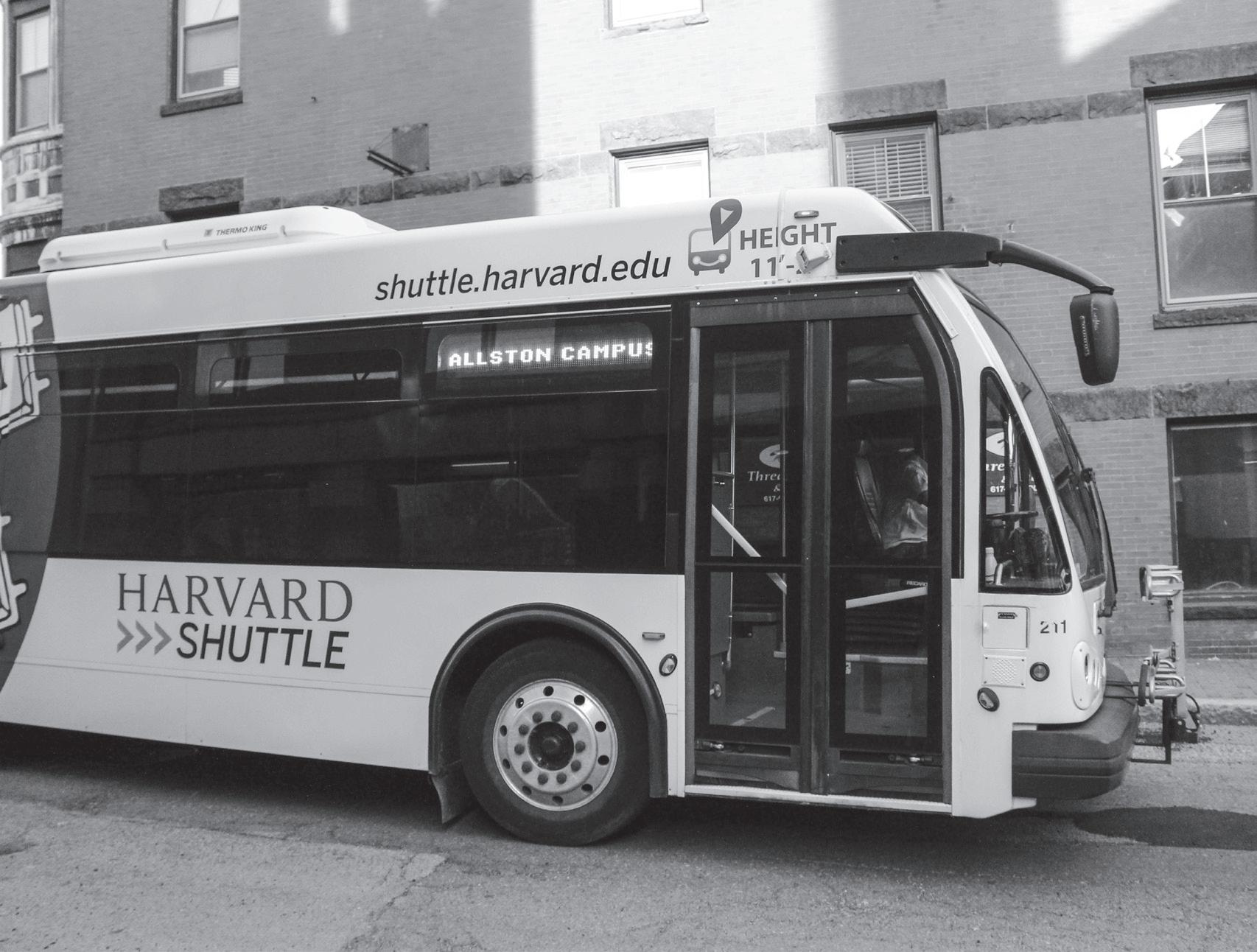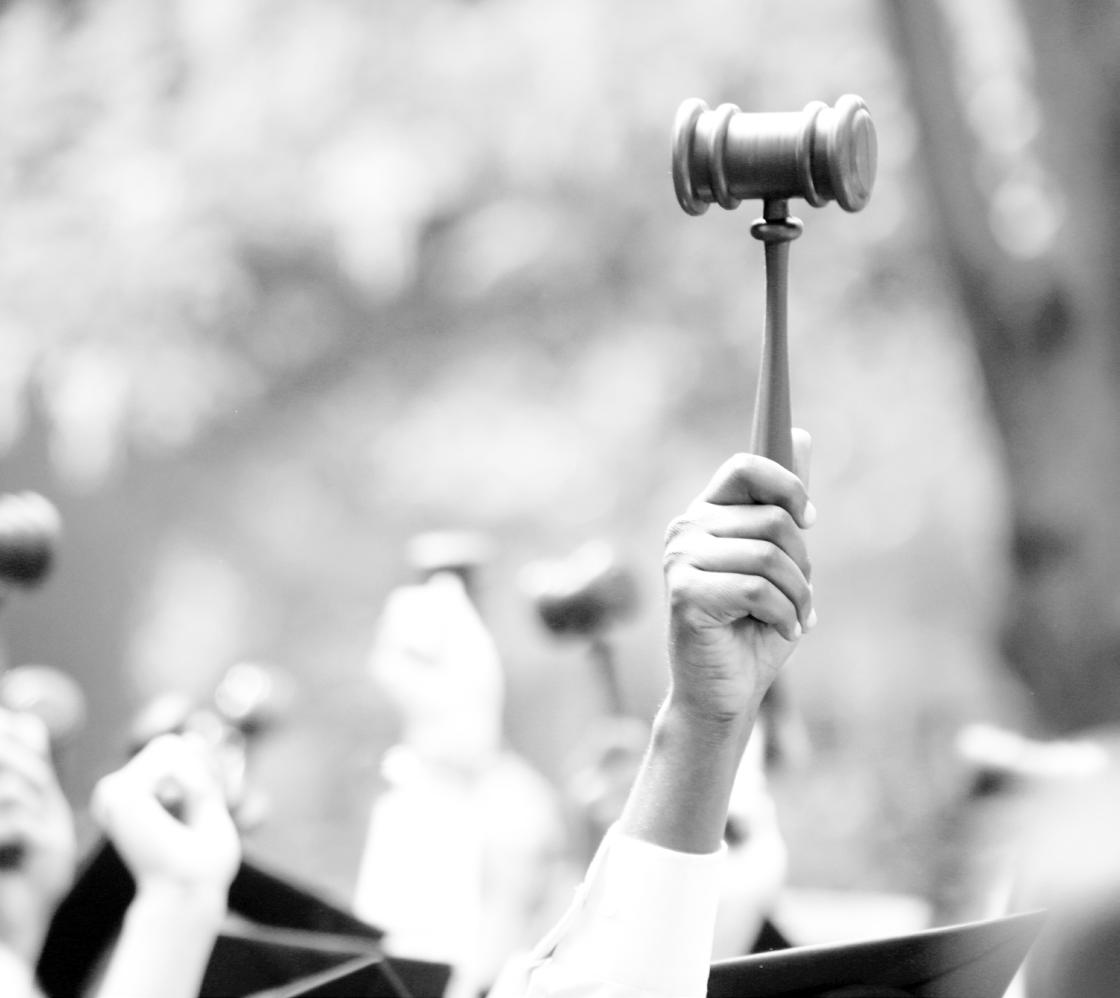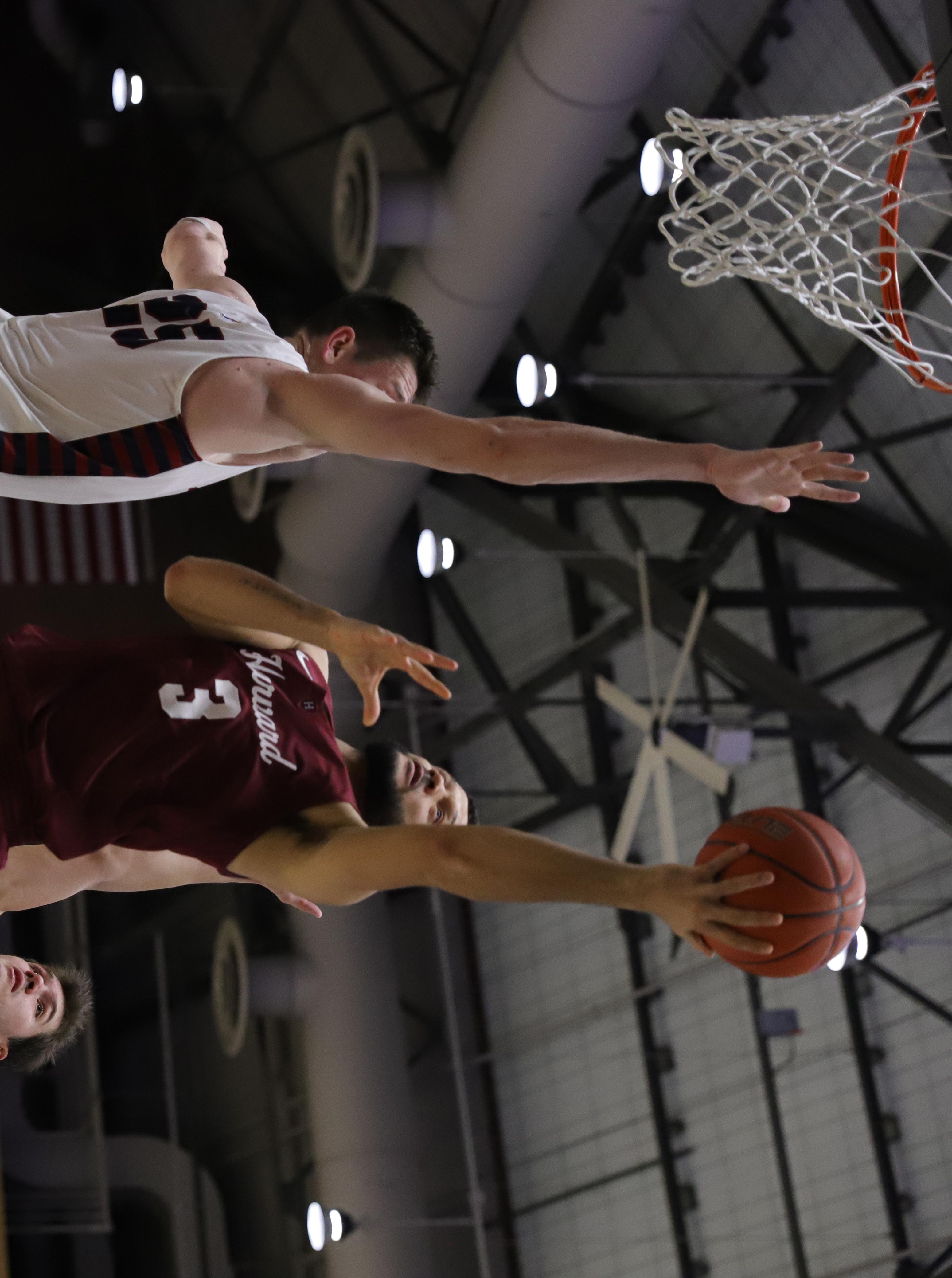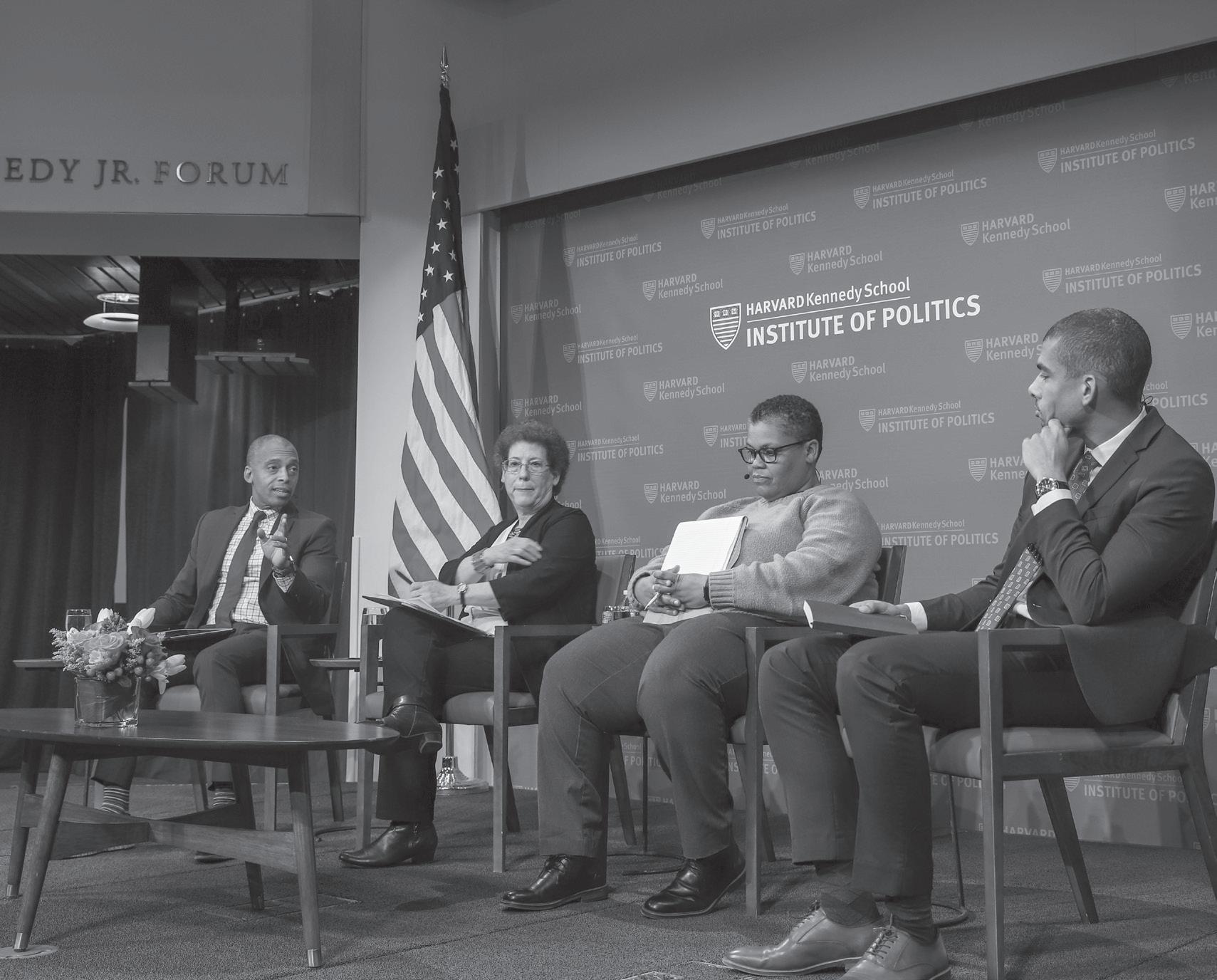
23 minute read
Editorial
THE CRIMSON EDITORIAL BOARD Prison Divestment and the Pitfalls of Moral Comparison
Private prisons only make a bad justice system worse.
Last week, the Harvard Prison Divestment Campaign filed suit against Harvard in Massachusetts state court over the University’s alleged investments in companies with ties to the prison industry.
Arguing that the University’s refusal to investigate the scope of potential investments in the prison industry amounts to a “violation of fiduciary duty and break of the Harvard Charter,” the five student plaintiffs asked the court to prohibit Harvard from investing in the “prison-industrial complex” and to make “such practices” illegal.
Private prisons take advantage of the overcriminalization of people of color for monetary gain. People of color are disproportionately stopped or arrested by the police, charged by prosecutors at higher rates, and sentenced to longer terms for the same charges.
The mistreatment of people of color by the criminal justice system is the result of an abominable combination of racialized socioeconomic disparities and race-driven legislation. For example, when Congress chose to differentially punish crack and powder cocaine, the sentencing disparity between black Americans and white Americans for drug-related crimes more than quadrupled. Increased sentences increase private prison profits.
Moreover, private prisons pervert the very principles of justice that should underpin the carceral system, creating structural incentives for disregarding and undermining these principles. For example, in 2009, two Pennsylvania judges were charged with taking millions of dollars in kickbacks in exchange for sending teenagers to two private juvenile detention centers.
But even as we recognize the violence of private prisons against communities of color and American society more broadly, we find ourselves feeling uncomfortable with the nature of divestment politics and our own position, as an editorial board, within them.
When we opined in favor of fossil fuel divestment last spring, we wrote that we think supporting divestment is appropriate only in the most extreme cases. But since then, we have confronted a number of calls for divestment — from Puerto Rican debt, from indigenous and agricultural landholdings, from Israel — that have posed the difficult task of having to compare moral wrongs and degrees of existential significance.
The existential and moral importance of fossil fuel divestment remains clear, but a reactive approach to divestment does not instantiate a meaningful approach to addressing the sociopolitical significance of Harvard’s financial practices.
Divestment campaigns are but one means, championed by students, to raise alarm against a political economy that underwrites deeply troubling and exploitative practices of capital accumulation.
In that light, the HPDC lawsuit represents the extreme (and justifiable) frustration — not least owing to the University’s often condescending indifference — that students have with the limited tools available to them to challenge such injustice.
After all, the issue they protest does not appear to be particularly juridical — certainly not in the sense of the landmark social justice cases that have appeared before United States courts. Rather, these students would seem to be constructing a legal claim — donating to a university, the values of which they evidently disagree with — in order to pursue a case in the courts that might more typically be pursued on the street or, as they showed last semester, the football field. As one plaintiff said in light of his $12.24 donation, “moral standing” was more important than “legal.”
And while we share the frustration of these students, we believe that oneoff editorials supporting the increasing number of divestment campaigns will tend not to constitute a meaningful critique of these structural problems or do justice to their activism. Just as it is not our place to pass judgment on each individual walkout and sit-in, so too it seems presumptuous to do so for divestment campaigns.
As such, though we continue to support divestment activism in its power to raise critical moral and social questions from students’ perspectives, private prison divestment does not meet our criteria for support.
But that’s not really what matters. What matters is that students are heard loud and clear: It’s time to shut down private prisons for the sake of those whom they dehumanize and the justice system they pervert.
This staff editorial solely represents the majority view of The Crimson Editorial Board. It is the product of discussions at regular Editorial Board meetings. In order to ensure the impartiality of our journalism, Crimson editors who choose to opine and vote at these meetings are not involved in the reporting of articles on similar topics.
Submit an Op-Ed Today! The Crimson @thecrimson
Dissent: We Shouldn’t Stop Listening — The Case for Prison Divestment DISSENT
Last Tuesday, the Harvard Prison Divestment Campaign filed a lawsuit against the University for its investments in companies connected to the private prison industry. In the lawsuit, HPDC argues that Harvard — specifically naming University President Lawrence S. Bacow, Harvard Corporation Senior Fellow William F. Lee ’72, and the Harvard Management Company — has failed to “manage the endowment in good faith” and has violated “its legal duty to consider the charitable purposes of its investments.
We acknowledge that the legal basis of this lawsuit is tenuous at best. That said, we laud the lawsuit’s effectiveness as a means to heighten awareness of the often sidelined prison divestment movement. Most importantly, we agree with the moral gumption of its cause.
Investments in companies managing private prisons are deeply immoral and signal a willingness to profit from the inhumane practices these institutions perpetuate. As such, the conversations HPDC has sparked on the morally reprehensible state of private prisons in the United States are valuable and urgent.
The list of injustices profit-motivated, privatized incarceration perpetuates is depressingly long. Inmates of color are disproportionately represented in private prisons where they are then unjustly housed in inhumane, unsafe conditions. The pursuit of profit encourages private prisons to delay the release of their inmates by actively reducing their likelihood of obtaining parole.
Beyond this, stakeholders in the industry erode democracy and decency. They have spent millions lobbying state and federal governments in favor of harsher and longer sentencing. Private prison operators such as CoreCivic and GEO Group — which HPDC asserts the University is connected to through a related Mid-Cap ETF fund — are also known operators of immigrant detention centers that, according to the New By SALMA I. ELSAYED, GUILLERMO S. HAVA, HANA M. KIROS, GABRIELLE T. LANGKILDE, DANIEL L. LEONARD, AND MARCUS B. MONTAGUE-MFUNI
York Times, contain “barely edible food, indifferent health care, guard brutality and assorted corner-cutting measures,” including those that house immigrant children separated from their parents. We recognize that there is a large discrepancy in the amount HPDC and the University estimate Harvard has invested in companies tied to the prison industry. Regardless of whether this figure is as large as the $3 million that HDPC alleges or the much smaller $18,000 that Bacow claims, we believe there is still a strong moral rationale for divesting. Either way, Harvard has effectively turned a blind eye to or, worse, signed off on these egregious injustices.But any fact-friendly person should be able to recognize the well-documented harm private prisons perpetuate. The issue, then, is not whether the private prison industry is highly unethical (it is) nor whether it actively hurts marginalized communities (it does). That much is beyond doubt. The question is how we, as a university community, ought to confront that reality.
Adopting a complacent, pessimistic stance, as this Editorial Board has, is tempting. It might even seem logical. Under an economic and corporate status quo in which child labor and environmental destruction remain commonplace, why even bother with ethical investment? Isn’t divesting from anything ultimately futile?
Yet cynicism has never been a friend of social change. In cases where the moral alarm is resoundingly, successfully raised, we believe it is the job of all University affiliates at large, and The Crimson Editorial Board, to listen. Though, in our campus’s divestment spring, dissecting all the arguments and movements calling for divestment may be overwhelming, dismissing all of these movements because they are numerous is ham-fisted. To adopt such a mindset obfuscates the University’s and our campus community’s responsibility to consider how to best address injustice and other complex moral quandaries.
In the spring of last semester, our Editorial Board articulated, in an overturning of long-held precedent, why it now supports fossil fuel divestment. The basis of this opinion was made clear: “Simply put, we should not allow our educations to be funded by the destruction of the environment and degradation of human life, particularly those who are already systematically disadvantaged.” To us, arguing that the conditions in prison prisons do not reach the standard of degrading human life or harming the systematically disadvantaged is illogical and facetious.
Harvard, because of its economic and institutional heft, enjoys a privileged position — one that allows it the unique fiscal flexibility to choose its investments responsibly and to nudge society in a positive direction. Pushing our university to do so, to avoid the most morally abhorrent investments from a field of tainted options, is far preferable to simply accepting that ethical perfection is unattainable; applying these moral standards — demanding that the food we eat and the buildings we live in are not partially subsidized by outright cruelty — is infinitely superior to indifferent resignation.
Our investments might never be perfect. But that doesn’t mean they can’t be better.
Dissenting Opinions: Occasionally, The Crimson Editorial Board is divided about the opinion we express in a staff editorial. In these cases, dissenting board members have the opportunity to express their opposition to staff opinion.
—Salma I. Elsayed ’23, a Crimson Editorial editor, lives in Stoughton Hall. Guillermo S. Hava ’23, a Crimson Editorial Comp Director, lives in Wigglesworth Hall. Hana M. Kiros ’22, a Crimson Associate Editorial editor, is an Integrative Biology concentrator in Pforzheimer House. Gabrielle T. Langkilde ’21, a Crimson Editorial editor, is a joint concentrator in Sociology and Studies of Women, Gender, and Sexuality in Eliot House. Daniel L. Leonard ’21, a Crimson Editorial editor, is a joint History of Science and Philosophy concentrator in Winthrop House. Marcus B. Montague-Mfuni ’23, a Crimson Editorial editor, lives in Pennypacker Hall.
Mind Full or Mindful? COLUMN
Javhlan Amgalanbaatar DARING TO BE
In front of you is a stunning view of a huge forest, up to a mountain top, and you are listening to the sound of birds chirping, with sunshine warmly touching your face, and fresh air coming in through your lungs. Breathing in, you take in this moment fully, and breathing out, you cherish the peace this moment offers you from the chaos of your life.
Moments in nature, similar to what you have hopefully just experienced in your mind, sparked my interest in mindfulness several years ago. During a summer countryside trip back in Mongolia, looking at a sunset beside a small lake, I could not help but notice how my thoughts disappeared and how I was simply aware of all my surroundings and sensations: the orange, pink, and red colors of the sky and the fresh smell after rain. It was freeing and peaceful not to think for a time and simply observe my surroundings.
Intrigued by these sensations, I started studying meditation and stumbled upon the concept of mindfulness. Mindfulness is defined in many different ways but on the simplest level, it is to be fully present and aware of what is going on in and around you at a given moment. After spending a few years learning more about it and trying to practice it daily, I realized anyone can bring even small mindful moments to their lives to improve their mental health and experience both good and bad moments more fully.
Coming to Harvard, I felt and feel constant stress and pressure to achieve, to do more and be more, caused by my own thinking and the ex
pectations I put on myself. Comparisons to other amazing students at Harvard certainly do not help, but intentionally bringing small mindful moments to my day-to-day life allowed me to be more grounded.
Mindfulness is usually connected to mindfulness meditation — a form of meditation in which the focus is on breathing and the present moment. There are even some studies that demonstrate the effects of mindfulness meditation on the brain. It would be redundant to list the benefits of mindfulness meditation, because of its increasing accessibility, so I wanted to expound more on what the distinct concept of mindfulness can mean at its very simplified core for busy and stressed-out college students.
The concept of being present sounds simple, but it is surprising how rarely we actually do it. With thousands of thoughts going through our minds a day, in our heads, we are usually daydreaming, worrying, or letting our mind wander even if we want to focus on something. Instead of having our “mind full” in this way, being mindful allows us to experience the moment, no matter how good or bad, without judgment or resistance. It starts from being aware of our thoughts, our surroundings, and accepting them as they come. I believe it is especially important for Harvard or any college student to take care of their mental space amid all the pressure and stress they surely experience some time during their college career. Whether by pushing ourselves to meet the deadlines of various classes and activities, or constantly worrying about the future and if we are doing enough, we exert so much energy into thinking, overthinking, ruminating, and agonizing. It is tiring. We burn out. That is why it is critical to allow our mind and body to rest, not only when we are asleep, but also when we are going through our days. Mindfulness is not limited to meditation, and we can bring it into every aspect of our lives, little by little.
For me, it begins with something as simple as sitting down for five minutes on my bed in the morning, before the chaos of the day ensues, simply checking in on my body and taking a few deep breaths. Sometimes it is being aware of the morning sunshine and adorable dogs when walking through the Yard instead of ruminating on what I said or did earlier.
Other times it is simply sitting with myself when I am stressed or sad and feeling the emotions and thoughts instead of resisting and suppressing them in my mind. Mindfulness is for anyone, and it can start from mindfulness meditation, or just noticing the patterns of the mind, paying more conscious attention to our surroundings, and consistently directing attention to our present reality.
Here, I also want to acknowledge that mindfulness is a broad concept, with a long and complex history, stemming from religious traditions, with differing definitions and practices. My definition has been simplified and covers only a small fraction of what mindfulness is.
That being said, I encourage my fellow students and those intending to improve their well-being to start practicing mindfulness in order to have more groundedness and experience both wonderful and painful times without getting caught up in their own minds.
Even though we might not find ourselves on top of a mountain, looking at a forest every day, there is still peace even in the chaos of things if we open ourselves more to the present and accept it without judgment through mindfulness.
Gates to Recieve Radcliffe Medal
By CAMILLE G. CALDERA CRIMSON STAFF WRITER
Melinda A. Gates will receive the Radcliffe Medal in May in recognition of her significant impact on women and girls worldwide through her work as a philanthropist and entrepreneur, Harvard’s Radcliffe Institute for Advanced Study announced Tuesday.
Gates is the co-founder and co-chair of the Bill & Melinda Gates Foundation and the founder of Pivotal Ventures, an investment and incubation firm focused on solving problems that impact American women and families.
The institute awards the medal — its highest honor — each year to an individual who embodies a “commitment to excellence, inclusion, and social impact,” according to a press release.
Tomiko Brown-Nagin, dean of the Radcliffe Institute, praised Gates in the release for her “remarkable” work. “We are honoring Melinda for her remarkable impact around the world, for putting women and girls at the center of the Bill & Melinda Gates Foundation’s work, and for her urgent and ambitious commitment to the unfinished business of empowering women here in the United States,” BrownNagin said in the press release. Gates announced in October that she was dedicating $1 billion to “expanding women’s power and influence” in the United States through Pivotal Ventures. She also released a best-selling book on the topic — “The Moment of Lift: How Empowering Women Changes the World” — in April 2019.
At the helm of the Bill and Melinda Gates Foundation, she has shifted the organization’s focus increasingly towards women and girls, according to the press release.
Additionally, the foundation has donated millions to Harvard over the past several decades, including a donation of $50 million or more during the 2018-2019 academic year, according to a University report sent to alumni.
Gates will receive the medal on Radcliffe Day, an annual celebration of the institute scheduled for May 29. In the release, Brown-Nagin added that other milestones will coincide with this year’s festivities.
“This celebration is especially fitting as we commemorate the 100th anniversary of the 19th Amendment and consider the work that remains to be done to achieve the promise of full enfranchisement and political empowerment of all women in the United States,” BrownNagin said.
2020 also marks the 20th anniversary of the Radcliffe Institute’s founding.
In honor of both the “historic moment” and Gates’s selection, a panel at the Radcliffe Day ceremony will explore women’s empowerment, per the release. It will include a panel with former University President Drew G. Faust, who was the founding dean of the Radcliffe Institute; Iris Bohnet, the director of the Women and Public Policy Program at Harvard Kennedy School; Thasunda Brown Duckett, the CEO of Chase consumer banking; Amanda N. Nguyen ’13, the founder and CEO of Rise Justice Labs; and Gina M. Raimondo ’93, the governor of Rhode Island.
Gates will also participate in a “wide-ranging keynote conversation” with philanthropist David Rubenstein prior to receiving her medal from BrownNagin.
Past medalists have included labor leader and civil rights activist Dolores Huerta, former Secretaries of State Madeleine K. Albright and Hillary Clinton, Supreme Court Justices Ruth Bader Ginsburg and Sandra Day O’Connor, and Nobel Prize-winning author Toni Morrison.
camille.caldera@thecrimson.com
Allston Move Raises Logistics Concerns
By ARVIN HARIRI CRIMSON STAFF WRITER
As the School of Engineering and Applied Sciences’ upcoming move to Allston approaches, SEAS students living in the Radcliffe Quadrangle say they are worried about travel logistics to classes across the river.
The Quad is located approximately half a mile northwest of Harvard Yard — and even farther away from the brand new, 500,000 square foot SEAS campus, where many classes will take place next fall.
Currier resident and Biomedical Engineering concentrator Anna M. Raheem ’20 said that he feels the new campus poses logistical difficulties for enrolling in classes on both sides of the river.
“I think it will be really difficult for students to enroll in classes, both at the Allston campus and at the College,” Raheem said.
Raheem added she hopes the University will implement a strong transportation infrastructure to ensure that students can be “fully integrated into the college environment,” as travel time will eat into students’ schedules.
“If engineering students are required to take all of their classes at the Allston campus, it would decrease the amount of time that they can spend in the houses or at the College,” she said.
Soheil Sadabadi ’20, a Currier resident and Computer Science concentrator, expressed concerns for dependence on the shuttle system.
“Even with the shuttle service, it will just create such a lo

The Allston Campus Express shuttle provides transportation from the Allston campus to Harvard Yard at approximately 15 minute intervals. RYAN N. GAJARAWALA—CRIMSON PHOTOGRAPHER
gistical nightmare, because having to commute 10 or 15 minutes between your classes just to go from a class in the Science Center all the way to Allston is going to be extremely difficult,” he said.
Meredith L. Weenick ’90, Harvard’s vice president for campus services, wrote in an emailed statement that the University will add “supporting roadways” and shuttle routes to address transportation needs to and from the Science and Engineering Complex.
“The creation of new supporting roadways will add to the overall functionality of the SEC,” she wrote.
“Harvard will also offer expanded and enhanced shuttle routes that include additional stops in both Cambridge and Allston and a direct Quad to SEC route via Harvard Square, as well as continue both daytime and evening van services as a supplement to the fixed shuttle routes,” she added. Weenick wrote the University will also improve on alternative modes of transport across the river.
“There are also plans for new pedestrian walkways, hundreds of bike and scooter parking spaces, protected bike lanes, new wayfinding signage and an updated digital tracking that will all contribute toward the safe and easy transportation both to and from the SEC,” she wrote.
arvin.hariri@thecrimson.com
Law School Professor Receives Backlash for Tweet
By KELSEY J. GRIFFIN CRIMSON STAFF WRITER
Harvard Law School Professor Adrian C. Vermeule ’90 sparked outrage online after posting a tweet on Thursday comparing attendees of the Summit on Principle Conservatism to concentration camp detainees.
The summit, set to occur in Washington, D.C. on Feb. 29, will bring together conservative leaders and activists to discuss conservatism in the United States and the next steps for the political movement. Vermeule posted an advertisement for the summit on Twitter which included pictures of 26 speakers scheduled for the event. The tweet — which has since been deleted along with Vermeule’s Twitter account — included the caption: “The very first group for the camps.”
The comment drew criticism from professors and Harvard alumni, who interpreted the line as a reference to Nazi concentration camps during the Holocaust.
“This sort of crude antisemitism isn’t protected by academic freedom,” Harvard Graduate School of Arts and Sciences alumnus Gerard S. Harbison wrote in a tweet. “Tweeting Holocaust jokes would a red line [sic] for me.”
Law School graduate and University of California, Berkeley Law School Professor Orin S. Kerr also responded to the tweet, noting his personal ties to the Holocaust.
“Bummed I wasn’t invited, but then my family hasn’t had good experiences in the camps,” Kerr wrote in a tweet.
Vermeule explained in an emailed statement that the tweet intended to point out that any distinction between conservatives who dislike Trump and Trump supporters would be irrelevant to a future administration controlled by the “extremist” left.
“As most readers understood, the tweet was a sardonic joke to the effect that if and when an extremist left-wing administration came into power, the Republicans who call themselves ‘Never-Trumpers,’ no less than any other conservatives, would soon be sent to gulags of the sort that were a staple of 20th-century Communist regimes,” he wrote.
Carrie F. Cordero, an adjunct law professor at Georgetown University, wrote in an emailed statement that she can read Vermeuele’s post as a joke, but does not find it appropriate for a Harvard professor. Cordero is slated to speak at the summit.
“The most generous reading of his tweet was that it was in jest and intended to be provocative,” she wrote.
“As a Jewish American and one of the individuals participating in the conference he was tweeting about, however, I believe his flippant reference to ‘camps’ has no place in civil discourse and disgraces Harvard faculty, students and alumni,” she also wrote.
Vermeule noted he considers this style of joke to be common on the internet and that he did not have any sinister intention to make the comment. He criticized “self-described Republicans” and “political opponents” for giving his joke an offensive interpretation. “In our political climate, a few very loud people will attempt to exploit any possible misunderstanding for political advantage,” Vermeule wrote. “If we allow these people to dominate public discussion and drive out free expression and political humor, however, we will all be worse off.”
kelsey.griffin@thecrimson.com
Bloomberg, Gates Are Major Donors DONORS FROM PAGE 1
Gates foundation donated at least $50 million to fund early childhood development studies and public health research at the T.H. Chan School of Public Health and the Medical School.
Kenneth C. Griffin ’89 — the founder and CEO of the investment group Citadel — donated $50 million to Harvard this year.
Griffin previously made the largest gift in College history, giving $150 million in 2014. Of that gift, $125 million went directly to the College’s financial aid office, which was subsequently re-named in recognition of his gift.
The estate of the late David E. Rockefeller, a banker and the grandson of Standard Oil founder John D. Rockefeller, also contributed $50 million, as did the Chan Zuckerberg Initiative and the Morningside Foundation.
Pediatrician and philanthropist Priscilla Chan ’07 and College dropout and Facebook CEO Mark E. Zuckerberg jointly founded the Chan Zuckerberg Initiative.
The Morningside Foundation is the family trust of brothers Gerald L. and Ronnie C. Chan, who pledged $350 million to the School of Public Health in 2014.
Lakshmi N. Mittal and his family also donated $25 million to the University last year. In 2017, Mittal announced a $25 million gift to establish an endowed fund for Harvard’s South Asia Institute, which was subsequently renamed for him.
Bloomberg Philanthropies, the philanthropic organization of current presidential candidate and former New York City mayor Michael R. Bloomberg, donated at least $10 million dollars during the donation period.
The government of the United Arab Emirates was also listed among the donors who gave at least $10 million.
In the past, they have funded the Emirates Leadership Institute at the Harvard Kennedy School.
At least one donor on the list has come under fire for initiatives it funds.
The John Templeton Foundation also donated at least $10 million.
In the past, the Templeton Foundation has been criticized for funding research that blends religion and science.
The Templeton Foundation did not respond to a request for comment on the donation or the criticisms.
ellen.burstein@thecrimson.com camille.caldera@thecrimson.com
SURVEY FROM PAGE 1
HUHS Launches Health Survey
Aside from asking survey-takers about their own health, HUHS also asked them about their perceptions of other undergraduates’ drug and alcohol use and sexual activity.
Before certain sections, the survey informs students that they are allowed to skip questions that are “upsetting or distressing.”
It also directs them toward a variety of HUHS services, including mental health counselors and the Office of Sexual Assault Prevention and Response. In an interview last week, Nguyen said he wants to use data from the survey to determine how to address student needs.
“I’m hopeful that a large number of students will participate,” Nguyen said.
“That’s how we understand the priorities that we will focus on in the coming couple of years,” he added.
Nguyen, who previously stated that he wants to focus on serving underrepresented groups on campus, said the survey — if it gets enough responses — will be a way to determine how to approach health issues for racial and ethnic minorities in particular.
“What I’m hoping for is that we have as diverse a group of students participating in this survey as possible, so that we can understand not only what the overall College population looks like in terms of their health, but also, can we look at racial and ethnic minorities and see if their experience is different from that of the general population?” Nguyen explained.
In a bid to increase participation rates, HUHS has tried to sweeten the pot for survey-takers by offering them a five-dollar gift card to El Jefe’s Taqueria or a five-dollar donation to aid the animals of Australia.
The survey closes on March 11, after which administrators will review the results.
Throughout fall 2020, HUHS will release major trends from the survey to Harvard affiliates.
fiona.brennan@thecrimson.com

Harvard, from the Law School to Longwood.
The Crimson thecrimson.com





